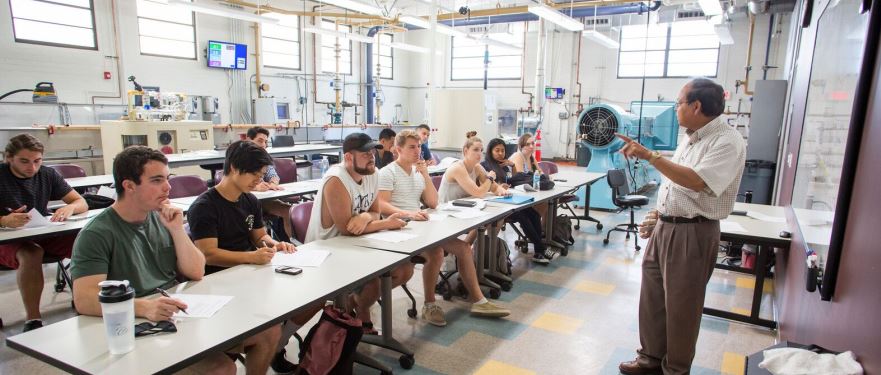Civil Engineering
What is Civil Engineering?
LMU's Civil Engineering major helps students understand how to plan, design and oversee construction of a wide variety of public and private engineering projects.
Projects that civil engineers are involved with improve quality of life, protect the environment, and contribute to economic growth. They include roads and highways, mass transit systems, airports, bridges, buildings, harbors, and flood control and drainage works. Civil engineers also work on water supply and water treatment and distribution systems, wastewater collection systems, irrigation systems, solid waste disposal facilities, pipelines, power plants, and disposal and reuse systems.
The Civil Engineering major learns to apply scientific and economic principles to evaluate the technical, economic and environmental feasibility of projects. Students learn to prepare environmental impact reports and conduct topographic and boundary surveys and soil and geotechnical investigations.
What do Civil Engineering majors do?
Civil Engineering majors examine both practicality ("how it works") and design ("how to build it"), all supported by a strong background in scientific and mathematical concepts and principles.
Civil Engineering majors gain hands-on experience in surveying, water engineering, soils engineering, structures, and environmental engineering. Coursework in ethics, economics, sociopolitics, safety, and other areas augments the educational experience.
Is this major right for you?
You might be a Civil engineering major if you:
- Like to build
- Enjoy math and science
- Enjoy systems and infrastructure
- Are both creative and disciplined
- Care about the natural and built environments
About our faculty
Our faculty members are experts in fields such as water and wastewater treatment, environmental systems, thermodynamics, structural analysis and design, computer modeling, surveying, hydro-climatology, sustainable development, climate prediction, change and variability, fluid mechanics, hydraulics, and statistical analysis.
Our faculty members are active researchers and writers who have presented papers at and co-organized conferences, served on boards and as the directors of municipal water districts and authorities, and worked and consulted extensively in the public and private sectors. One faculty member was part of the Intergovernmental Panel on Climate Change team awarded the 2007 Nobel Peace Prize.
About our students and graduates
Our students have access to seven distinct LMU laboratories, as well as a machine shop and technical support staff. Students are active in the American Society of Civil Engineers.
Majors continue their studies in graduate programs at institutions such as MIT, Stanford, UC Berkeley, UCLA, USC and other universities. Graduates have gone on to work for private, governmental, and academic firms and institutions – including civil and environmental engineering consulting firms, architectural and construction firms, aerospace corporations, oil refineries, and municipal agencies that handle water, power, and sanitation. Some of our graduates have also become successful entrepreneurs by starting their own professional companies.
Representative courses
Our courses have included:
- Mechanics of Materials
- Civil Engineering Design
- Surveying and Mapping
- Seismic Design of Structures
- Structural Theory
- Fluid Mechanics
- Introduction to Environmental Engineering
- Particle Dynamics
- Analytical Methods in Civil Engineering
- Soil Mechanics
- Water Resources Planning and Design
- Fundamentals of Water and Wastewater Treatment
- Computers and Environmental Analysis
- Groundwater Hydrology
- Air Pollution Analysis
- Independent Studies
